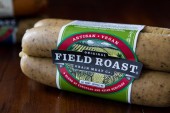by Michele Simon
As a lawyer who has called out plenty of transgressions by unethical food companies, it’s frustrating when the law gets it wrong. That’s exactly what happened to the alternative meat company Field Roast, based in Seattle, but also selling products to our neighbors to the north. That is, until the Canadian government informed Field Roast that the company’s products were mislabeled. Not only that, the products also had to be tested — wait for it — on live animals.
Here is how Field Roast’s blog explains the situation:
The regulations rule that we are making a “simulated meat product” and need to add this language to our labels. The standards for a “simulated meat product” require a Protein Efficiency Ratio (PER) study (conducted using live animals) to evaluate the protein in relation to animal meats.
Let me get this straight: A company making an alternative to animal foods is supposed to test their products on live animals to prove the products are similar to animal foods? The company’s CEO David Lee explains his understandable dismay: “We’re driven to make these foods because we feel very strongly about having compassion for animals.” Hello. The Canadian Food Inspection Agency also wants Field Roast to add chemical supplements and vitamins for fortification, which Lee finds “offensive.” As he should.
 Another irony is that the type of protein test results Canada requires does not currently exist because as Field Roast explains, they make a “protein-rich vegetarian sausage entirely from wheat, vegetables and real ingredients”, as opposed to soy or other more recognized proteins.
Another irony is that the type of protein test results Canada requires does not currently exist because as Field Roast explains, they make a “protein-rich vegetarian sausage entirely from wheat, vegetables and real ingredients”, as opposed to soy or other more recognized proteins.
Apparently a “competitor” made a complaint, and that’s how this whole Kafkaesque episode got started. There is no safety issue here (current products can remain in stores until they run out), only a dumb regulation that sounds suspiciously like it was written by meat lobbyists. For example, a “simulated meat product” that resembles sausage must have “a total protein content of not less than 11 per cent” and “a fat content of not more than 25 per cent”. Why are these foods being compared to meat for nutrition content? Who else would benefit from such laws other than an industry threatened by competing products?
This situation is a sad example of how an innovative company can get caught up in nonsensical regulations intended to benefit the status quo. This problem will only get worse with more alternative animal products going mainstream. For example, plant-based innovations such as egg-less “Just Mayo” from Hampton Creek arebecoming more popular. Large chains like Walmart, Target, Kroger, Safeway, Costco, and even Dollar Tree are signing deals to carry Just Mayo, according to TIME. With this level of success, innovation and regulation will inevitably collide. And run-ins with the powerful animal food industry will escalate. Right on cue, the American Egg Board launched a PR response to the “huge threat” Hampton Creek poses to Big Egg.
Field Roast says they are trying to work things out with the Canadian government, and let’s hope they do. Meanwhile, an unhappy Field Roast customer in Toronto has started a Change.org petition, in which he is asking (among other things) for his government to eliminate the testing requirement, as well as to allow companies to use common names such as “milk” and “meat” on vegetarian products. The issue of not being able to name alternative animal products what companies would like to is also a huge problem in the United States, and I will soon write more about that.
Yet another reminder that new and growing food companies should be engaging with food lawyers, at every stage of their development, to protect against these sorts of risks.

















